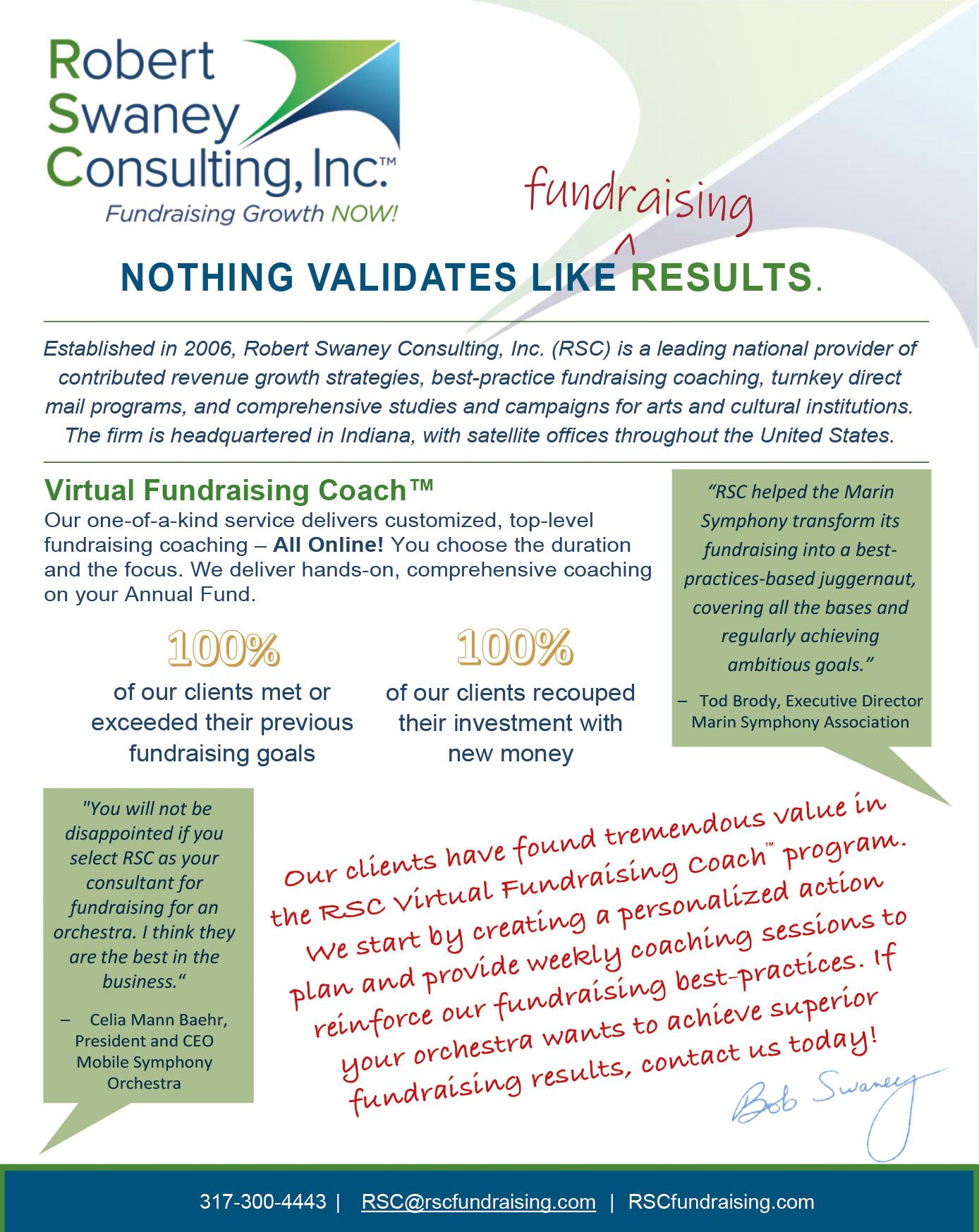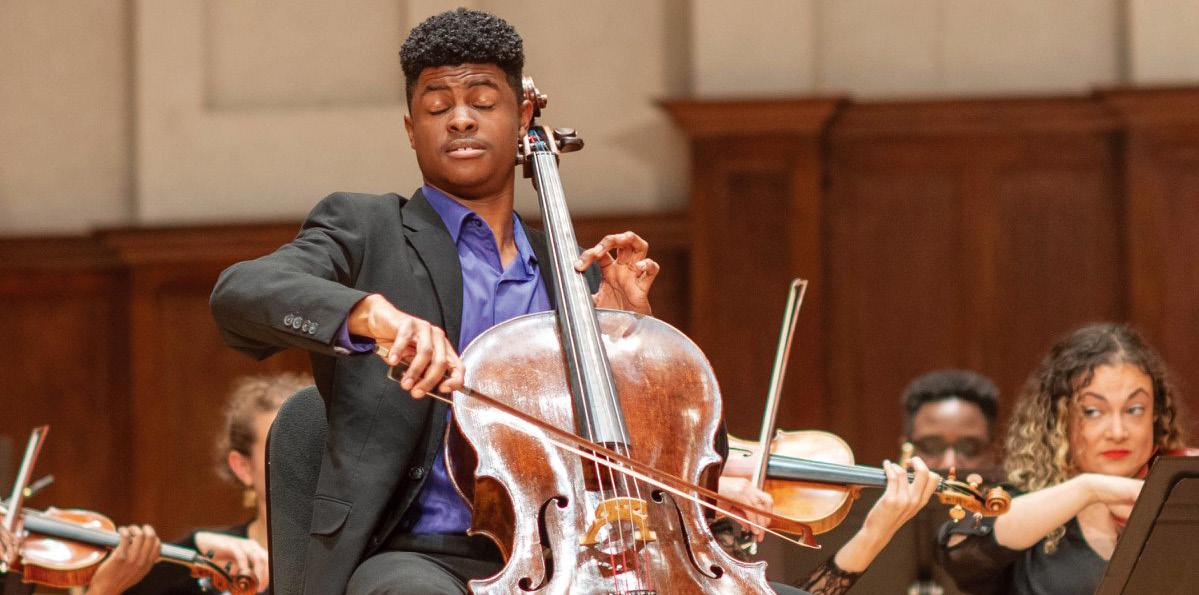
6 minute read
Coping With COVID
The League of American Orchestras is helping orchestras by researching and reporting how orchestras—and their audiences—are dealing with the pandemic.
CULTURE + COMMUNITY
IN A TIME OF TRANSFORMATION
©2020 Culture Track
The global pandemic has upended the status quo for orchestras and their audiences. Orchestras are improvising in real time as they adapt to ensure the safety of musicians, staff, and audiences with temporary shutdowns, postponements, shifts to digital music-making and chamber-scale concerts, and performances in the great outdoors. As COVID-19 evolved from its first iteration to the Delta and now the Omicron variants, new ways to keep the music playing while keeping everyone healthy—most recently, vaccine and mask requirements—are being tried and tested. Further, the national reckoning with racial injustice that emerged in the wake of the murder of George Floyd and too many others mean that the classical music field is now examining its own longstanding lack of forward movement on equity, diversity, and inclusion.
How are orchestras managing, experimenting, innovating? In the face of the ongoing pandemic, what do audiences expect of orchestras? What do orchestras expect of themselves? The League of American Orchestras is helping orchestras understand where they stand—and where they might head—with multiple surveys, studies, and research projects. Working with expert research partners, the League is asking orchestras and audiences, essentially, how and what they are doing, and then publishing the data after rigorous analysis. Recent studies
A SPECIAL EDITION OF
Key Findings From Wave 2 | November 23, 2021
More than half of classical arts attenders in one survey say they hope that arts or culture organizations will change after the pandemic to become more relevant to more people.
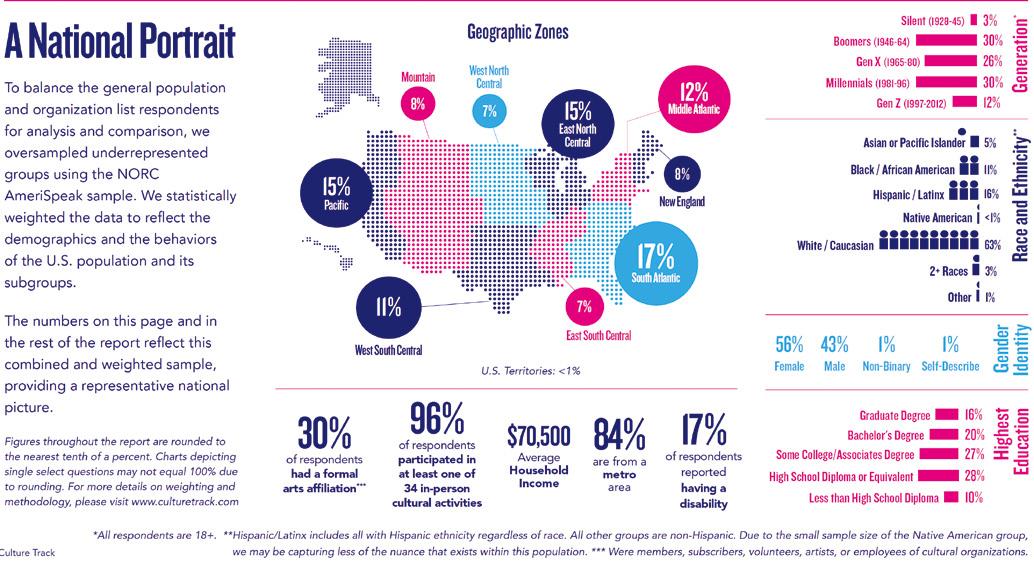
from the League data partnerships with WolfBrown, TRG, and Slover Linett covering multiple topics are available at the League’s COVID-19 Data Partnerships webpages. With these data partnerships, the League is taking orchestra data to the next level, supplementing its substantial orchestra data and research work and connecting members with insights on audience behavior to help navigate the pandemic and plan ahead.
On January 25, the League’s “Understanding Audience Motivations in a Time of Ongoing Uncertainty” webinar unpacks key findings from Culture + Community in a Time of Transformation—A Special Edition of Culture Track, a report by Slover Linett Audience Research and LaPlaca Cohen that
analyzes a sample of more than 75,000 Americans and compares insights from the first 30 days of lockdown with audience perspectives more than a year into the pandemic. (The webinar was made possible by a grant from the Wallace Foundation.) Using insights from the Culture + Community study, the League webinar, available live and as a post-event recording at https:// americanorchestras.org/event/understanding-audience-motivations-in-a-time-of-ongoing-uncertainty/ reports on the level of participation in online cultural activities among classical music attendees (which is particularly high) and highlights opportunities for audience diversification through digital offerings. Presenters María Huiza, strategist at LaPlaca Cohen, and Madeline Smith, project director and research operations lead at Slover Linett Audience Research, also explore what classical music attendees want more of in their lives as they engage with arts activities in the pandemic era. The webinar also provides insights from the general population that highlight a desire for change in the cultural sector and point to the possibility of a more relevant and resilient future for the arts.
Culture + Community in a Time of Transformation: A Special Edition of Culture Track is a collaboration between LaPlaca Cohen and Slover Linett Audience Research. The study, which began in 2020, aims to connect the cultural sector with the experiences and needs of its communities and audiences during the pandemic and beyond. Reports of findings from successive nationwide Culture + Community surveys have been issued since 2020 and will continue.
The Culture + Community study covers a wide spectrum of arts and culture. However, key findings that are pertinent to what the researchers term “classical” arts—including orchestras—have recently been released and are reprinted below. (Read more complete results from this study and other League research projects at https://americanorchestras.org/learn/resources-data-and-research/covid-19-data-partnerships.)
The League is taking orchestra data to the next level, supplementing its substantial orchestra data and research and connecting members with insights to help navigate the pandemic.
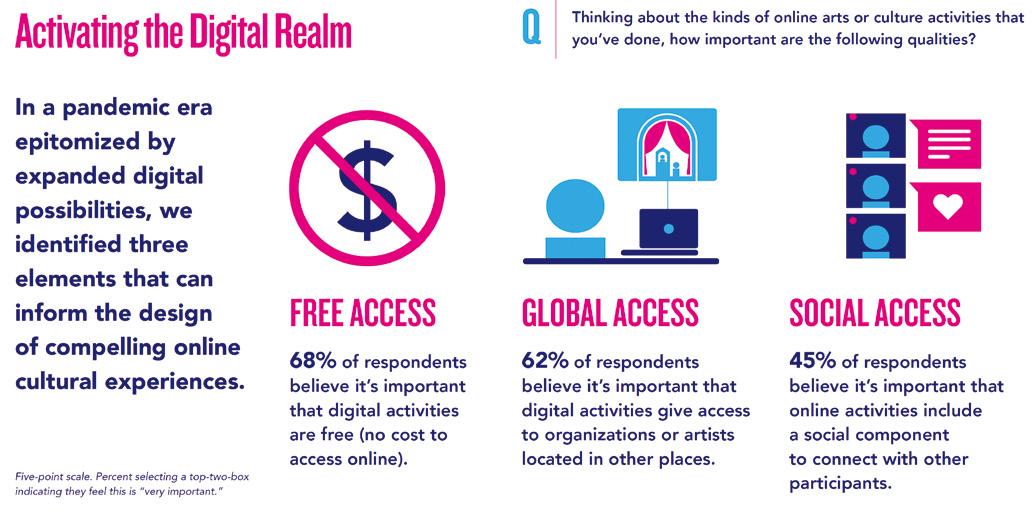
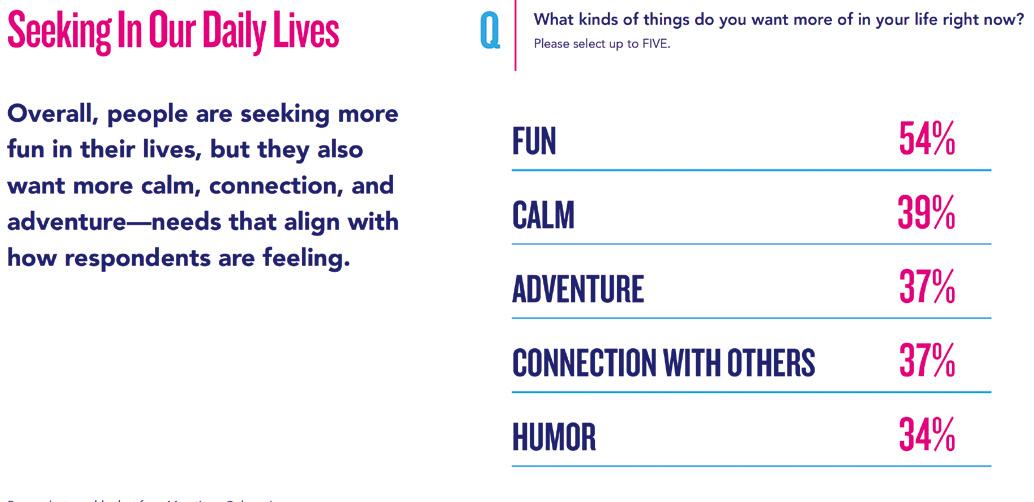
All graphics are from the Culture + Community in a Time of Transformation study.
Needs During Covid
With respect to what kinds of things people want more of in their lives right now, classical attenders want
connection with others to a much greater degree than
other Americans (55% vs. 37%)—in fact, it’s number one on the list for classical attenders, whereas fun is the top quality for Americans overall. Almost all (99%) of classical attenders want arts or culture organizations to help their communities during the pandemic, primarily by providing moments of beauty or joy (69%), providing opportunities to laugh or relax (68%), bringing people of different backgrounds together (55%), and staying connected (50%). However, just a third of classical music attenders have
seen arts and culture organizations actually helping
their communities. But classical attenders are still much more likely to say that arts or culture organizations are important to them personally (81%) than Americans overall (56%).
Online Activities
The vast majority (86%) of classical attenders did some
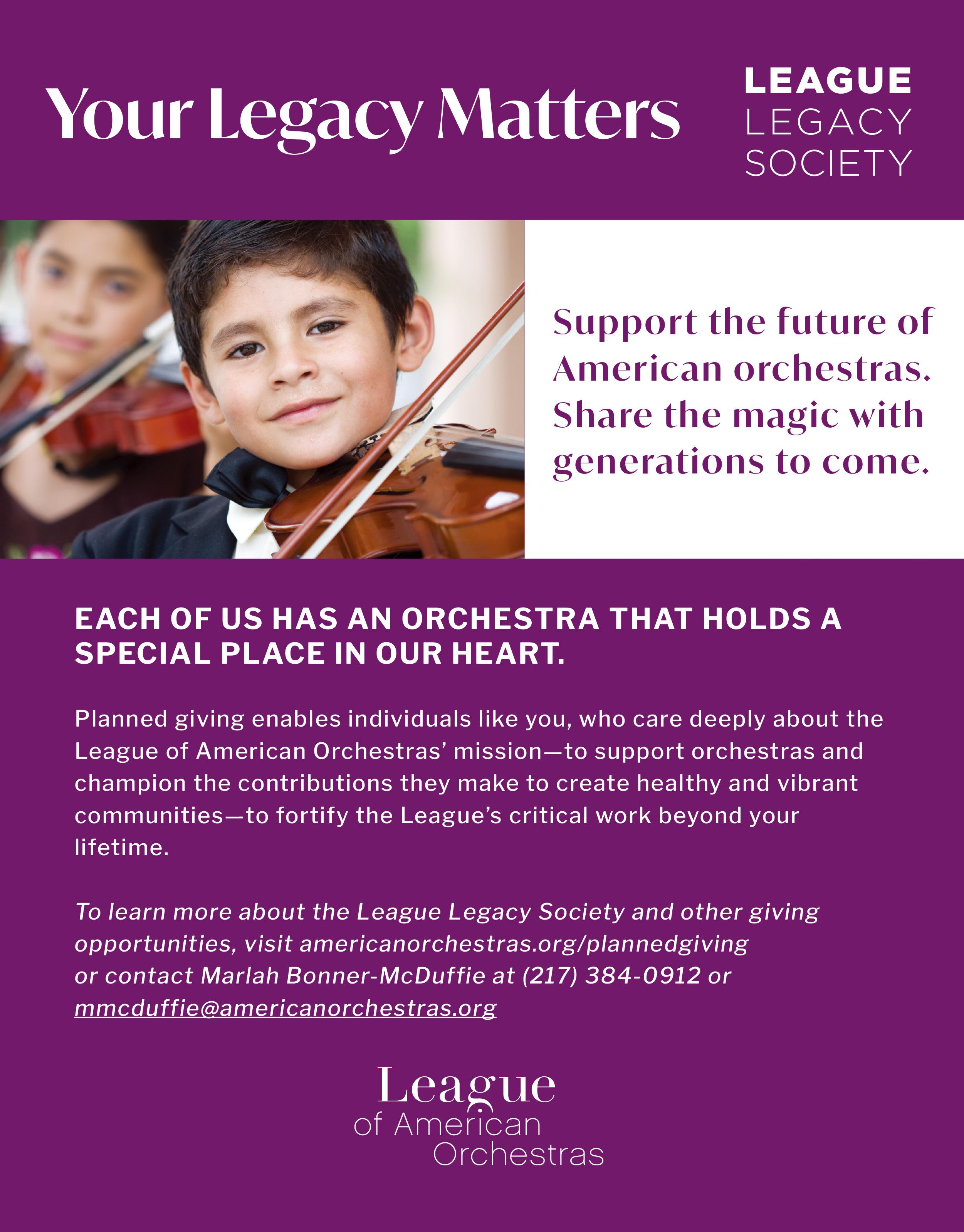
kind of online arts or culture activ-
ity over the past year (compared to 64% of Americans overall). Livestream performances (46%), pre-recorded performances (46%), and podcasts about arts/culture (38%) were the most common offerings used. While higher than Americans overall, just 29% of recent attenders
had used online offerings provided
by a classical music group (vs. 8% overall) over the past year. Among those doing arts or culture activities online, fewer than half of classical
music attenders have paid for an online arts or culture activity over
the past year (44% vs. 26% overall).
Need/Desire for Change
More than a third (36%) of classical attenders believe there is systemic racism in orchestras (compared to 28% of Americans overall). Notably,
74% of attenders believe arts or culture organizations should address social issues in their communities
(76% for Americans overall). And systemic racial injustice is the issue most believe arts or culture organizations should address (46% of attenders vs. 42% overall). Classical attenders are also more likely than the general public to want to see arts
or culture organizations involving
their communities and collaborating with them to create programs (67% vs. 61% overall).
More than half of classical attenders (54%) hope that arts or culture
organizations will change after the pandemic to become more
relevant to more people—on par with the national overall at 53%. And when the researchers proposed specific kinds of change, classical attenders expressed the most interest in affordable entry prices (63% vs. 53% overall), support for local artists (44% vs. 33% overall), and bringing new perspectives from outside their community (32% vs. 23% overall).
Helping Orchestras with Data Partnerships
The League of American Orchestras has partnered with TRG on Orchestras in Recovery: Ticket Sales and Donation Trends, 2019-2021, which highlights data from 27, mostly larger-budget U.S. orchestras participating in the COVID-19 International Sector Benchmark, as compared to the larger cohort of U.S. performing arts organizations participating in the Benchmark. The report compares ticket sales and donations from individual patrons for two specific time periods: November 2020-October 2021 and November 2018-October 2019. Learn more at https://americanorchestras.org/learn/ resources-data-and-research/covid-19-data-partnerships/trg-covid-19-sectorbenchmark/.
The League of American Orchestras has partnered with WolfBrown’s Audience Outlook Monitor, which surveys and tracks audience attitudes about attending cultural events during and after the pandemic. Fifteen League-member orchestras participate in the study by asking their audiences multiple times about vaccination status, masking mandates, willingness to return to concert halls, concerns about COVID-19, and related issues. Read the full report at https://www.audienceoutlookmonitor. com/league-of-american-orchestras. The League will work with WolfBrown to examine audience attitudes about inclusion, diversity, equity, and access in the coming months.
Recent studies from the League’s data partnerships are available at the League’s COVID-19 Data Partnerships webpages.
